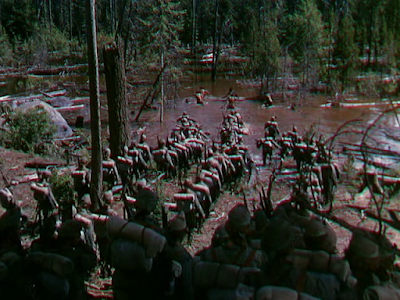The Citadel (King Vidor, 1938) Dr. Andrew Manson (Robert Donat) gets off the train at the Welsh mining town of Blaenly in which he's been employed as an assistant, only to find the doctor he's working for, Page, is himself, lain up in bed. Not a good sign. He finds that in his new job he's poorly paid, and only has a small room to live in. And—as always in small towns—nobody trusts the new doctor or vet or priest or shopkeeper or whatever until he does them a good turn that seems miraculous. In small towns, trust is earned and then spread by word-of-mouth, just like a communicable disease.
That miraculous moment doesn't occur until, when he is called to a miner's home to deliver a child, he is confronted with the woman already having given birth, the child stillborn. But, Manson is able to resuscitate it and, for awhile, there is that trust in the community. Passed by word of mouth, trust is also communicable in small villages. He makes the acquaintance of another doctor, Denny (Ralph Richardson), who has been dealing with these issues longer and is quite cynical, a cynicism which is self-medicated with a healthy dose of alcohol. "No hospital, no X-ray, no ambulance, no anything. If you want to operate you use the kitchen table." The two compare notes on a pernicious cough that veteran miners have displayed while the two take patient calls.A typhus epidemic, however, erupts throughout the town, devastating the community, and the two idealistic doctors decide that the best remedy is fight the source, trying to convince the mine owners of the danger of the sub-par sewer system, and then, when rebuffed, they decide to go to extremes, prescribe themselves some civil disobedience and blow it up, forcing the "do-as-little-as-possible" owners to have to replace it. The mine-owners had evidently taken a hypocritical oath. Denny tells Manson of a position to be filled in the mining town of Aberalaw, but holds little hope of being accepted as he's not a married man. Well, that's a bit of a problem. What's the remedy?
Well, it so happens the good doctor has made the acquaintance of the local school mistress, Christine Barlow (Rosalind Russell), who's seen the good works the doctor provides her students, and the two decide to (for the betterment of Aberalaw, of course!) get hitched. The two work together, helping patients by day and by night studying the debilitating effects the mining industry has to the lungs of the community. He publishes his findings which are hailed by the medical community, but the miners—much like the mine-owners in Blaeny—are more concerned with how their livelihoods might be affected. So, they take a note from the doctor's past and before he can (maybe) blow up the mine, they ransack his office...because...the studies they don't like have already been published. Angry mobs are not so much concerned with timing. This is why they are miners and not scientists (rocket or otherwise).Well, being the pariah of the community doesn't do much for one's medical practice no matter how altruistic, so doctor and wife move to London, deciding to set up a clinic in one of the city's poorer districts, because...hippocratic oath and humanitarianism and all that bleeding heart stuff (come to think of it, that's something I would call a doctor for!) And this is where the movie gets very interesting because at some point, he is persuaded by a school-friend of his (played by Rex Harrison) to specialize in diseases of the rich and hypochondriacal—which is sort of a communicable disease among doctors...it doesn't blacken the lung so much as the soul.
Well, it so happens the good doctor has made the acquaintance of the local school mistress, Christine Barlow (Rosalind Russell), who's seen the good works the doctor provides her students, and the two decide to (for the betterment of Aberalaw, of course!) get hitched. The two work together, helping patients by day and by night studying the debilitating effects the mining industry has to the lungs of the community. He publishes his findings which are hailed by the medical community, but the miners—much like the mine-owners in Blaeny—are more concerned with how their livelihoods might be affected. So, they take a note from the doctor's past and before he can (maybe) blow up the mine, they ransack his office...because...the studies they don't like have already been published. Angry mobs are not so much concerned with timing. This is why they are miners and not scientists (rocket or otherwise).Well, being the pariah of the community doesn't do much for one's medical practice no matter how altruistic, so doctor and wife move to London, deciding to set up a clinic in one of the city's poorer districts, because...hippocratic oath and humanitarianism and all that bleeding heart stuff (come to think of it, that's something I would call a doctor for!) And this is where the movie gets very interesting because at some point, he is persuaded by a school-friend of his (played by Rex Harrison) to specialize in diseases of the rich and hypochondriacal—which is sort of a communicable disease among doctors...it doesn't blacken the lung so much as the soul.
Okay, it's 2022 and you're SO SUPERIOR for pointing out that a doctor specializing
in Black Lung Disease is so smoking so cavalierly.
How will it turn out? Will the doctor heal himself of his over-charging frivolous ways to patients who'll pay through the nose (or any other orifice), or will he go back to helping the poor who resent him for trying to help them with things they don't want help with?
Do you want the movie answer, or the "real-world" answer?
See it twice and call me in the morning.











